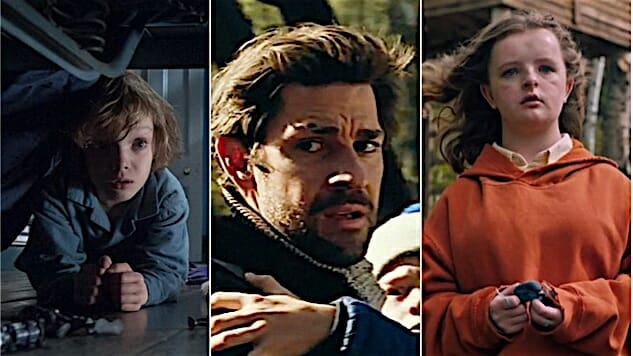Hereditary, A Quiet Place and the Horror of Grief
The latest thrillers dive headlong into the unthinkable.

This discussion of Hereditary, A Quiet Place and some other recent horror films contains detailed references to their plots and badass endings. You should beware of spoilers.

It’s said that when you lose a parent you’re an orphan, when you lose a husband or wife you’re a widow or widower, but that when you lose a child there’s no word for what you are. It’s that unspeakable. It’s also the territory into which some of the most notable of our latest horror movies have charged relentlessly, unsparingly ahead. There’s always something eerily telling in our movie monsters, in whom they hurt and how they menace and haunt and devour. The boogeymen of our current moment make the hulking slasher film antagonists of yesteryear seem almost quaint by comparison.
“We just had our second daughter about three weeks before I read the script. And so I was already in the state of terror of keeping this girl safe.” —John Krasinski, in an interview about his film A Quiet Place
I was watching my girlfriend’s kids one time and noticed something wrong with the youngest’s ankle. Pulling a pant leg up revealed a rash the likes of which I’d never seen. It turned out to be an autoimmune issue—nothing immediately threatening and not the result of anybody’s actions. It cleared up inside of a month. I kept it together, and everything turned out just fine.
I can’t remember when I’ve been closer to actual panic. It was a fear that made me reflexively angry in the aftermath, at nobody and for no reason.
Krasinski and his real-life wife and possible actual valkyrie Emily Blunt have only a handful of lines in A Quiet Place, the thriller set in a blasted-out remains of an Earth ravaged by creatures that attack at the slightest noise. Their panicked faces tell the entire story throughout the movie, which begins by establishing the stakes as shockingly as possible. Their youngest son’s innocent lapse with an electronic toy—all inside of one unwatched moment—is all it takes for the whole family to witness him vanishing down the gullet of one of the creatures.
Even though a year passes between that fittingly chilling cold open and the rest of the film, it’s easy to recognize the oppressive silence Krasinski and Blunt’s family labors under. Grief is a time of silence and things unsaid—of holding things inside for fear they might burden your loved ones. For many people going through loss, it often feels like you’re expected to remain stone-faced and soldier on. There’s always something that needs doing. Crying about it won’t help. In the case of A Quiet Place, the feeling of danger at expressing those emotions is merely made all the more literal.
Every family member is wrestling with the aftermath of their loss in a different way. The other son, Noah (Noah Jupe), whose need for medical care in the opening scene incited the whole thing, seems to live in constant fear that his life will be cut short at the merest slip-up. Their daughter, Regan (Millicent Simmonds), believes her father blames her for introducing the deadly toy in the first place. And their mother puts on a brave face, but, the moment she discovers she’s in a safe room where she can’t be heard, she unburdens herself on her husband, relieving the tragedy that took her son from her and her own possible fault in it.
In one of the many clever details of the film, Regan is deaf, laboring under a defective cochlear implant that her father tries in vain to get working. It’s never stated—because this is the sort of film that treats its audience as if they are educated adults—but it’s entirely possible the only reason the family is so deft at surviving in the first place is that they all sign in order to communicate with Regan.
Ultimately, it’s the family’s ability to communicate—to express each individual member’s devotion to one another—that gets them through the apocalyptic horror of the movie. As scary as it is, the script feels neat and the ending almost joyous. There has been loss, but the family has come together to work as a team that has one another’s backs. It’s hard to feel bad about a movie that ends with Emily Blunt cocking a shotgun like she’s about to rip and tear Doom-style through the predators that threaten her family.